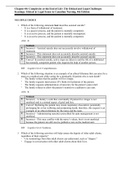Exam (elaborations)
Ethical & Legal Issues in Canadian Nursing 4th Edition - August 1, 2019
Prepare for practice with the essential text dedicated to Canadian legal and ethical issues! Focused solely on the ever-changing, and often complex health care landscape in Canada, Ethical & Legal Issues in Canadian Nursing 4th, Edition expertly covers the often intertwined ethical and legal issues...
[Show more]



